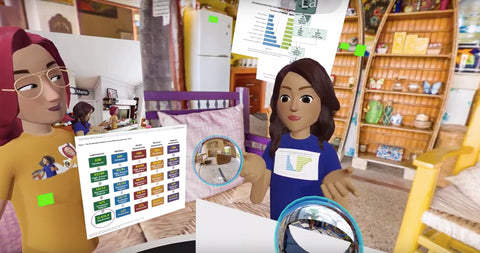Maria Salcedo, USC DSW

It is an honor to be a Doctor of Social Work student at the University of Southern California (USC) and having the support of TecnoLatinx!
I am very fortunate to be part of USC community where I can express myself and develop a program that will create an impact for Latinas. I was raised in South Central, Los Angeles and earned my high school diploma from the Los Angeles Conservation Corps-High School. I am very fortunate to have taken advantage of the opportunity to experience higher education, starting from Sierra College, transferred to Sacramento State University, and now back to USC where I completed my MSW and soon to be a doctorate. For many years I have dreamt of this opportunity as growing up I was frequently told that I was better off working and not in college let alone, graduate school.
Testing VR Cafecito inside Facebook Spaces
Every Latina deserves a doctoral education! Less than one percent of Latinas have a doctoral education, in part, because they lack the essential and appropriate support of a mentor. Education is a critical social determinant that shapes our health, where we live, and productivity throughout life. Higher education allows individuals to contribute to the economy, improves social and economic standings and gain better access to medical care, all of which are fundamental roots for a long and productive life. Educational attainment serves as an intervention to overcome social class and economic inequities that can result in health inequities. Therefore, this project's goal is to advance long and productive lives via educational attainment.
A culturally specific mentoring approach will be used to mentor Latinas in doctoral studies in a VR Casa (home) and VR Cafecito Connection. Our mentors will be known as comadres (Godmother). Within an educational context, the comadres will guide mentees through their doctoral journey. This will allow comadres to build essential relationships as respected friends, advisors, mentors, and colleagues while also working toward increasing retention of Latinas in postgraduate studies through the practice of comadrismo/mentoring.
VR was selected as the medium of expression to harness technology for social good with the ability to reach Latinas all over the world with significant social impact. This medium provides the Latina community with access to virtual reality, a powerful resource that might not have been previously accessible. Additionally, this innovation is future-proof. It disrupts traditional mentoring practices that would require the student to be physically present with her mentor and allows access anywhere in the world. Mentees and mentors will be able to explore and immerse themselves in a supportive and encouraging virtual reality environment that will create positive change for Latinas in postgraduate studies.
By: Maria Salcedo, DSW (USC)